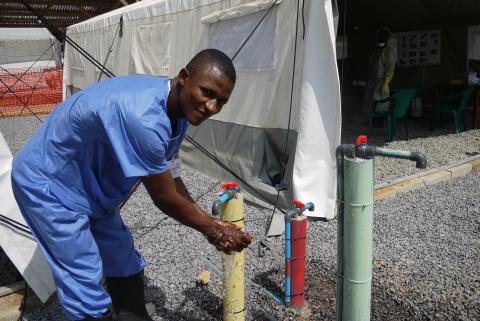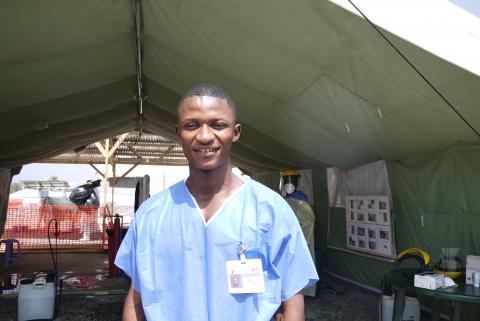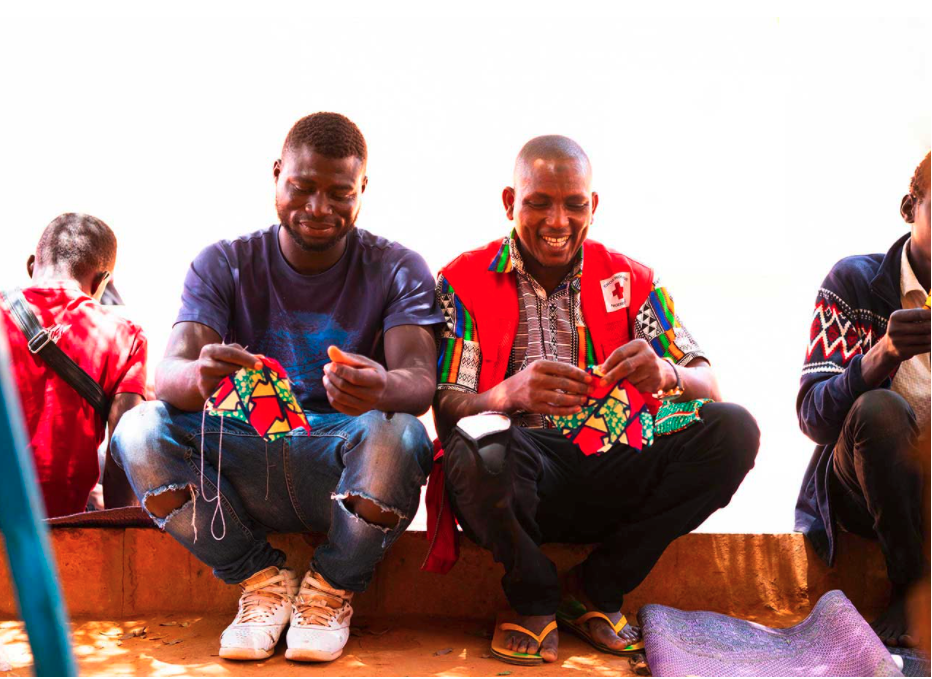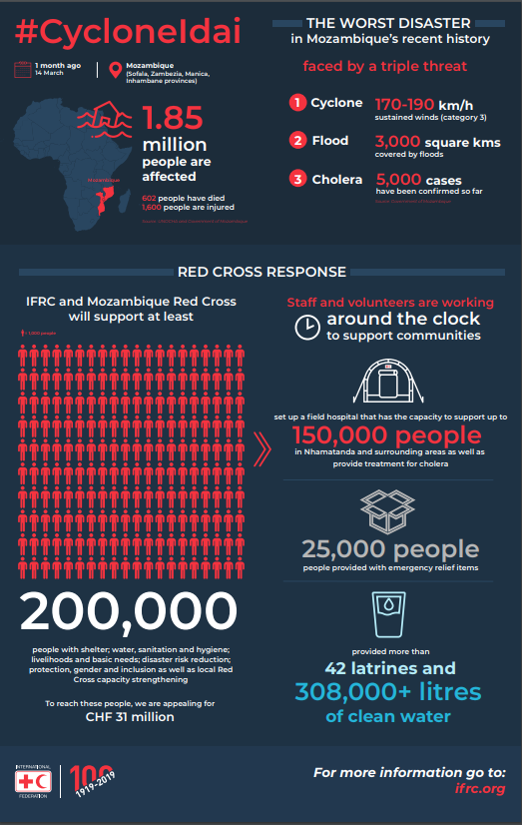Being an Ebola responder at an Ebola treatment center: the story of Francis Nallu

This is the story of Francis Nallu, an Infection Prevention Control Supervisor, working at the Ebola treatment center (ETC).

I supervise and train a lot of people on how to do the job. I am proud of myself. In the Infection Prevention Control (IPC) unit we have a lot of work to do. Without IPC, the Ebola treatment centre (ETC) cannot exist because we are responsible for the cleaning of the centre, both the low risk and high risk areas. We even help clean the patients. If the patient is weak, we will be the ones going in, taking all the vomit and cleaning around her or him, and seeing that everything is neat and tidy.
IPC is also responsible for admissions, together with the nurses. We are responsible to make sure that each and every one entering the high risk area puts on the correct protective equipment, the personal protective equipment (PPE). We make sure that they are well dressed, no mistakes, no leakage, everything is tied neatly.
We are also responsible for the reusable scrubs, to rinse them, to launder them. We have the laundry machine and we have special people dedicated to that. We have a lot of responsibilities. We are the ones who are also responsible for the undressing or removal of PPEs. We dress the people and we undress them again. We have some sprayers, sitting all the time waiting for someone to come from the high risk area to spray (and disinfect). They remove all the protective equipment they have put on, and then we throw them away. For the reusable items (boots, heavy duty gloves, goggles, aprons), we dunk them in chlorine three times and send it to the milder .05 chlorine solution outside. Then someone in the laundry department will come and remove it and take it to the laundry.
I supervise a team of 20 IPC staff and 12 nurses.
Before Ebola, I was a volunteer at the Kenema branch of the Sierra Leone Red Cross. I saw people going to the Red Cross, rendering their service as volunteers and I asked, “What is going on?”. People said, “That’s the voluntary service of the Red Cross, humanitarian.”. I thought I would love to be in there so I devoted myself and started volunteering at the branch. Then in March, we had the outbreak in Guinea so we started sensitization in Kenema. In May, we had the first case in Sierra Leone, in Kailahun district, so we continued. We divided Kenema township into 16 sections and started sensitizing people about Ebola – what to do, what not to do, and how to protect themselves. We did that for over two months, then the outbreak was all over Sierra Leone, so they came and built the ETC in Kenema. They asked some of us if we were ready to work at the ETC. I volunteered and said that I was ready to serve humanity, because I vow to serve humanity, no matter how costly it is. So we gave our names, went for training, and then on 13 September, we opened the ETC.
It was hard, it was difficult, the first weeks. People go through a lot of constraints. Some of us, we were disowned and pushed away by our parents because they don’t like us to do this kind of job, because it is a deadly job and because of the risk. This is what we call epidemic disease, so no one has control over it. But we stay devoted and say we will do this, we will serve the nation and we will help our people. I was living with my aunt and she threw me out because I was working at the ETC. So I found a place where I could pay, but the landlady also gave me notice as soon as she found out I was working at the ETC. I went back to my aunt and begged her, so she understood and she accepted me back. I went through a lot of constraints and it was so difficult. The fight was not easy.

In Kenema, we started to have fewer patients, and that is great. The Red Cross asked us if we wanted to go work in Kono. People said, “Oh no – I’m not going because the case in Kono was so worse, so bad.” They were afraid. Then I stood up again and said, “I will be at the front. I will go and help my people.” So that’s how I came to Kono. I facilitate new staff through the procedure – how to put on PPE, how to do every little thing pertaining to the ETC as far as high risk is concerned. All these things they are doing, I taught them how to do it so now they can do it on their own. First they were afraid of the job and said they cannot do it. But now they understand and they do it and I praise to God they know how to do their work.
Despite the many challenges, what keeps me very motived is that I have sympathy for my country and my people as a whole. Ebola has taken so many lives away. I have this knowledge to save people, to render my service to people. If I see it as, “oh no, I will be afraid of this disease”, who else will help? We just need to continue beating this epidemic, this disease.
I think it’s good for me to share what I know with people, to have this understanding that this is bad, but we have to fight it to go from our country. That keeps me motivated to help. If this is out of Sierra Leone, then I am free, I am free to do whatever things I want to do. But if still this epidemic exists in Sierra Leone, it means my life is in danger. And my family’s life is in danger. So we need to join hands and fight Ebola to go away from this country.
This story is part of the Words Against Ebola campaign – an intiative to share positive words, messages and values to create a community of global support to get to zero cases of Ebola. The campaign aims to promote knowledge, fight stigma, alleviate fear and overcome complacency through the sharing of positive words. Words can be powerful and when we share them, we share our values, and the ability to turn them into action.
For more information about the Words Against Ebola campaign visit: http://wordsagainstebola.org/

Lessons Learned :
Supporting Materials :



